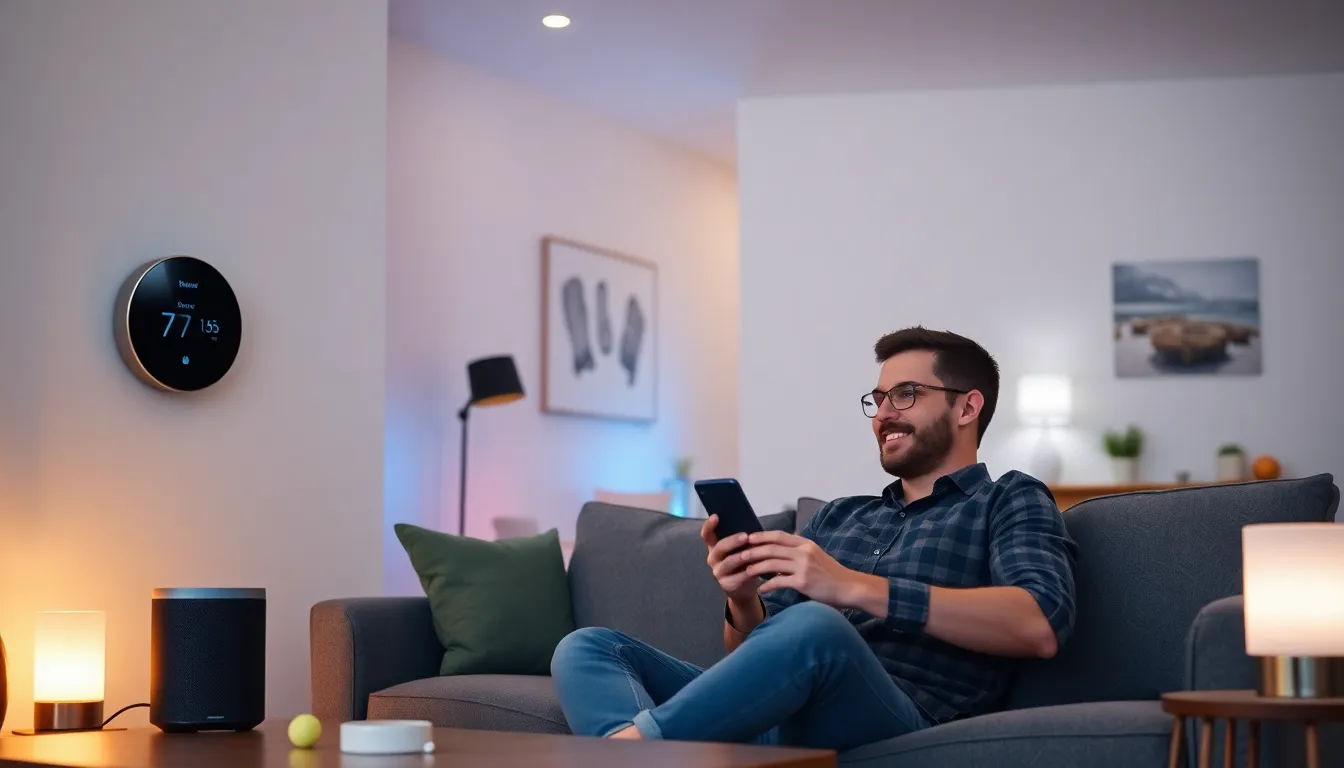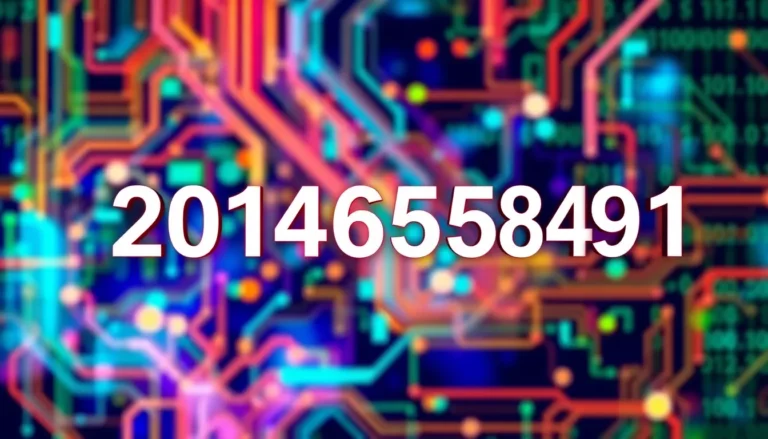Imagine a world where your fridge knows when you’re out of milk and orders it for you, while your thermostat adjusts the temperature based on your mood. Welcome to the Internet of Things (IoT), where everyday objects become smart companions. This technology isn’t just a sci-fi dream; it’s transforming industries and enhancing daily life in ways that are both practical and downright fun.
From smart homes to healthcare innovations, IoT use cases are popping up everywhere like popcorn at a movie theater. Companies are leveraging these connected devices to boost efficiency, cut costs, and even create new revenue streams. So whether you’re a tech enthusiast or just someone who enjoys a little convenience, exploring the exciting world of IoT will reveal how these smart solutions are making life not just easier, but a whole lot cooler too.
Table of Contents
ToggleOverview of IoT Use Cases
IoT application spans multiple sectors, driving innovation and efficiency. Smart homes utilize connected devices for enhanced convenience. Users can control lighting, temperature, and security systems remotely, creating tailored living experiences.
In healthcare, IoT enables remote patient monitoring. Medical devices track vital signs and transmit data in real-time. This technology enhances patient outcomes by allowing timely interventions based on accurate information.
Manufacturing benefits from IoT solutions through predictive maintenance. Sensors placed on machinery monitor performance and detect issues early. As a result, companies reduce downtime and enhance productivity significantly.
Retail adopts IoT to optimize inventory management. Smart shelves can track stock levels and automatically reorder products. Such advancements lead to improved customer satisfaction through better product availability.
Agriculture leverages IoT for precision farming. Sensors gather data related to soil moisture and crop health. Farmers optimize resource usage and increase crop yield by analyzing this data accurately.
Transportation systems use IoT for fleet management. GPS-enabled devices provide real-time tracking of vehicles. This technology improves delivery times and reduces operational costs efficiently.
Smart cities enhance urban living through IoT-enabled services. Traffic lights adjust dynamically based on vehicle flow, reducing congestion. Waste management systems track bin levels, optimizing collection routes and frequency.
In the energy sector, smart grids utilize IoT for demand response. Sensors monitor energy usage and manage loads efficiently, promoting sustainability. These use cases demonstrate the vast potential of IoT across various domains.
Smart Home Applications

Smart home applications leverage IoT to enhance daily living through automation and connection. Users can enjoy greater comfort and security by integrating various devices and systems.
Home Automation
Home automation streamlines daily tasks with connected devices. Smart thermostats learn user preferences and adjust heating and cooling accordingly. Lighting systems enable users to control brightness and colors remotely through smartphones. Smart appliances, like refrigerators, notify users of expiration dates and help manage grocery lists. Voice-controlled assistants facilitate seamless operation of different devices, enhancing convenience. Such automation produces a more efficient living environment, allowing users to allocate time for other priorities.
Security Systems
Security systems utilize IoT technology to bolster home safety. Smart cameras offer real-time video feeds accessible remotely, providing peace of mind. Sensors detect unusual activity and send instant alerts to users’ smartphones. Smart locks allow users to control access to their homes without physical keys. Integration with alarm systems enhances overall security measures, ensuring timely responses to threats. Remote monitoring capabilities enable swift reactions, leading to improved home safety and increased confidence in home security.
Industrial IoT Use Cases
Industrial IoT (IIoT) significantly transforms various sectors, leading to enhanced efficiency and productivity. Companies leverage these technologies to optimize operations and reduce costs.
Predictive Maintenance
Predictive maintenance utilizes IoT sensors to monitor equipment health in real time. This technology assesses performance data to predict failures before they occur. By analyzing metrics like vibration and temperature, factories reduce unplanned downtime. Equipment can receive alerts when anomalies arise, allowing teams to act proactively. Overall, businesses enhance operational reliability while extending asset lifespan.
Supply Chain Management
Supply chain management benefits greatly from IoT integration, ensuring transparency at every stage. By enabling real-time tracking of inventory and shipments, companies can minimize delays. RFID tags and GPS sensors provide constant updates, improving logistical efficiency. This technology optimizes inventory levels and reduces waste through accurate demand forecasting. As a result, businesses can respond swiftly to market changes, increasing customer satisfaction.
Healthcare IoT Use Cases
Healthcare IoT applications transform patient care through advanced technologies. Remote patient monitoring exemplifies this by enabling healthcare professionals to track patients’ vital signs in real time, significantly improving health management.
Remote Patient Monitoring
Remote patient monitoring uses wearable devices to collect data on heart rate, blood pressure, and glucose levels. These devices send information directly to healthcare providers, allowing for immediate assessment. Professionals can intervene quickly if abnormalities arise, enhancing patient outcomes and reducing hospitalization rates. This technology empowers patients to manage chronic conditions more effectively from the comfort of their homes. Studies show that remote monitoring reduces healthcare costs by decreasing in-person visits and emergencies.
Inventory Management
IoT solutions streamline inventory management within healthcare facilities. Smart shelves equipped with sensors monitor stock levels, alerting staff when supplies are low. Effective management reduces waste and ensures essential items are always available. RFID tags track medications and equipment, improving accountability and preventing errors. Data analytics helps predict future inventory needs based on usage trends, optimizing purchasing decisions. These advancements enhance operational efficiency, ultimately leading to better patient care.
Agriculture IoT Use Cases
Agriculture increasingly utilizes IoT technologies to enhance productivity and sustainability. Various applications in this sector demonstrate significant benefits in efficiency and resource management.
Precision Farming
Precision farming leverages IoT devices to optimize field-level management. Sensors monitor soil moisture, temperature, and nutrient levels. Data collected informs farmers when to water or fertilize crops, minimizing waste. Autonomous tractors equipped with GPS help reduce overlap in planting and spraying, ensuring precise application of inputs. Drones perform aerial monitoring of large farmland, providing insights on plant health and identifying areas needing attention. This combination of technology leads to improved crop yields and sustainable practices.
Livestock Tracking
Livestock tracking systems rely on IoT solutions to monitor animal health and location. GPS-enabled collars provide real-time location updates, ensuring livestock remain within designated areas. Wearable devices record vital signs, alerting farmers to potential health issues early. Cloud platforms consolidate data, offering insights into feeding patterns and reproductive cycles. This information enables better management decisions and enhances overall animal welfare. Effective tracking reduces losses, boosts productivity, and supports better resource allocation in livestock farming.
The Internet of Things continues to reshape how people interact with their environments and manage daily tasks. Its applications span numerous industries, driving innovation and efficiency. As smart devices become more integrated into everyday life, they not only enhance convenience but also promote sustainability and improved health outcomes.
The ongoing advancements in IoT technology promise even greater transformations in the future. By embracing these innovations, individuals and businesses can unlock new opportunities and streamline operations. The journey of IoT has just begun, and its potential remains vast and exciting.



